- Home
- Rosanne Hawke
Dear Pakistan Page 6
Dear Pakistan Read online
Page 6
The car followed me, slowly, insidiously; the passenger door was opening.
‘Jaime.’
They don’t usually know your name, do they?
‘Hey, Jaime!’ The voice was more insistent now. And familiar. I sneaked a look and saw blue. Wasn’t that the blue car always parked in the Year 12 area? The door was open, the driver’s hand on the front seat, the other on the wheel.
‘C’mon, hop in. I’ll take you home.’
I slid my bag in and then myself. I still wasn’t sure it was a great idea. ‘Why did you do that, Blake? Don’t you know crawling cars scare the hell out of girls?’
‘I’m sorry. You looked so miserable, all I could think of was helping.’
‘Thanks, anyway.’
‘You in a spot of trouble?’ Was that part of his student council job, to check up on kids in distress?
I wasn’t going to tell him anything at all but it all tumbled out amid directions to our house, even to being sworn at on the street. He was so much easier to talk to than any of the teachers. In a way it was even easier than talking to Danny for I was beginning to realise that Danny relied too much on my responses as if he had a personal stake in the outcome. Blake didn’t.
‘You know, I was born in the back of beyond.’ He grinned as I stared across at him in surprise.
‘You?’
‘Yep. Beyond the proverbial black stump. I board with a family so I know a little of what it’s like to be out of your environment.’ His attention was taken for a moment, changing gears.
‘Why does everyone have to be from another culture or a different environment to understand how I feel? Why?’ I sounded bitter, even childish. Deep down, I knew the answer, even then.
‘Because people are basically self-centred. We only know our own scene. We feel secure in that. Different ways, different people upset the equilibrium.’
I wouldn’t have been that blunt but it sure gave me an open window into what he must have gone through in the beginning.
‘You made it.’ My voice was almost a whisper but he grinned.
‘One day I realised I was thinking just like they were – why don’t they see me, understand me? When you were in Pakistan, I bet you did things the way the people did there. Why?’
‘Because they wouldn’t understand anything else.’
‘Same here. I had to put myself into these city kids’ shoes.’
‘But everyone here’s educated. They know better. They should be able to accept different people. In Pakistan only twenty-five percent of the people could read. Maybe only half the population understood there was even a world beyond the Middle East. They can’t help the way they think.’
‘It’s not education that does it, I’m afraid.’
‘But I don’t want to be like the kids here, to think like them. It’s so provincial, so … so rude and unfriendly. Their jokes aren’t funny, just putting someone down.’ I couldn’t think of more things to say that adequately described what I felt right then. ‘Besides, it’s cold here when it rains.’
Blake’s voice was surprisingly gentle. I thought he’d call me out for being discriminatory myself. ‘You don’t have to think like them. You never will. You’ll always be that little bit weird, different.’ He smiled and I liked it. He made weird sound special.
‘But we have to understand how they think or why they do things and not step on toes. We have to show we’re willing to listen, like we want them to listen to us.’ He almost had me won over when he ruined it. ‘We have to show we need them.’
‘Need them? They’ve got nothing I need. Like a hole in the head I need them.’
‘There must be something. I bet you can’t pick out clothes yet.’ How did he know? ‘Couldn’t you ask one of the girls to take you shopping?’
I bristled like Basil’s tail when the dog next door puts his paws on the top of our fence. ‘I don’t care about having the right clothes on. They’re stupid. The skirts are too short, the tops are too tight, the colours don’t suit me.’
‘That wouldn’t stop the girls at school.’ He actually laughed, then stopped when he saw I didn’t even smile. ‘OK. What about something else? Say you want to buy a present for someone, so you go to town to get it.’
‘I don’t know how to go to town. The trains scare me.’
‘Then ask one of the girls to take you.’
But who? Kate didn’t fit the description of a Good Samaritan and the image of Debra solicitously explaining how to buy a train ticket suddenly revived my sense of humour.
I glanced across at Blake who was concentrating on a corner. There were many things I didn’t know. Mum hadn’t had time to do everything, and besides, she had a fortyish way of picking out presents. I knew girls here would rather jewellery or a DVD than a cute box for the dressing table. How would I ever pick out a DVD? Grudgingly, I started to get his point.
‘Is that what you did?’
‘Yeah, my old man gave me some advice when I first came down to the city. He said, “Son, keep your mouth shut, don’t think you’re better and at the first opportunity, ask for help.”’
‘Did you do it?’
‘Not at first. I was a real rookie. I still said “g’day” when everyone else said “hi”. I couldn’t hear the difference.’ I looked at him in sympathy. I wasn’t that bad.
‘I’d never been to the movies,’ he went on. I grinned. ‘Got in with the wrong chick—nearly got into trouble. I couldn’t read the cues. It was like being on the freeway going the wrong way but the signs saying “go back” were in a foreign language.’
Tell me about it, I was thinking; I’d been there too. I still was. ‘After a few scrapes on the oval, I remembered Dad’s advice. It worked. That’s why I’m passing it on to you. Maybe you could try it.’
He turned the engine off. It took a moment to realise we were home already. I just sat there, not knowing what to say. He’d made me feel better but how to say that without seeming to come on to him?
‘Thanks,’ was all I said. He smiled a bronze Aussie smile as he leaned over and opened the door. I found out later it didn’t open for anyone else but him.
‘Don’t try too hard, Jaime. You’ll do OK.’ His voice actually wobbled a bit and I heard the raw faith as if he’d spelled it out for a hard-of-hearing person. He really meant it. One tear dribbled down my face as I quickly got out and ran up to the porch. I turned and waved. I was crying again but this time I didn’t mind; someone actually believed I’d make it!
It was a furtive group of people that emerged from the gate that night. There were guards with machine guns lining the walls of Suneel’s family house. By a scratching sound above me I knew they were on the flat roof too.
Suneel was especially ill-at-ease. It was as though he couldn’t get rid of us quickly enough—scanning the alley and glancing behind him towards the river. He bundled Elly and Andrew into the covered jeep while servants loaded the luggage. Dad helped Mum into the back before climbing in beside the driver. Dad liked being in the front to get the most thrills. Jeep rides in the Himalayan Mountains were not unlike roller-coaster rides.
Then, I don’t know how it happened, Mum was moving over for me and in the same moment, Suneel was shouting and pushing me to the ground. The jeep roared off down the lane, splattered with little flashes of light from gunfire that burst out from the dark. I dropped my head down. I couldn’t hear the jeep anymore. I prayed they’d get through. Suneel’s men were firing towards the river, the shots reverberating so loudly I thought my brain would burst.
Who knows why things happen the way they do. Maybe the driver thought we were all in. Did Suneel push me down because there was no time to lose? Or was it all part of some pre-arranged plan? All I knew was that my family was driving away and I was being shielded from gun fire by Suneel lying practically on top of me.
It was as tho
ugh I was in a safe, dark pocket in the ground; Suneel was so warm, the gunfire seemed far away. Then I was jolted to reality as I was dragged towards the gate. I got up on my haunches and scuttled in the rest of the way by myself. Suneel was all apologies.
‘Your life was more important than your honour,’ he was trying to explain, totally embarrassed, as his mother tut-tutted and fussed over me. I was glad. An uneducated man in the street would have left me to die for fear of touching me and ruining my good name.
Suneel rushed off then, after a man threw him an assault rifle. His mother took me into the room where her husband was sitting up in bed, heavily bandaged. I guessed the household had a resident hakim. There was a short exchange between the two, as the khan’s face changed from one of welcome to concern. He turned to look at me.
‘Beti, I am sorry you are left without your family, but do not worry. They will be safe as you will be. You are as my own daughter until they can return for you. My wife and servants are going to the house of my mother tonight until this trouble is over. You will go with them.’
I almost protested. What if I didn’t want to? I could end up in some Himalayan village and never be seen again. But what else was there for me to do? As I nodded my consent I wondered when it would ever be safe to leave with all that noise going on outside.
10
That evening, my heart lifted as we walked up to the Rasheeds’ house. There were little dark-headed kids running around in the light from the verandah, the girls in frilly silk dresses unseen in Australian shops, the boys in black pants and embroidered white shirts. Elly had copied me and worn a shalwar qameez. Andrew never joined in on our dressing up. I was beginning to envy him in a way; wherever he went he was still uniquely Andrew.
Even Mum had succumbed to Pakistani national dress, although she had protested while I was getting dressed that Pakistanis who had lived in Australia as long as the Rasheeds wouldn’t expect me to wear their clothes. I ignored her, for I knew how much Yasmeen appreciated it when I did.
Yasmeen was already at the door before we’d even pushed the button. One of the little kids had probably spread the word that the Angrez, the English, had arrived. From that moment it felt as if the clock had been turned back three months.
‘Jameela!’ Yasmeen was so excited she was practically squealing. ‘Come in, come in.’ Inside, it was more deafening than I expected. It seemed as though everyone was determined to get in as much Pakistani time as they could: the music was louder, the laughs were heartier, the silk clothes were only what I’d seen people wear to weddings in Pakistan, not to a house party. The women were actually dripping with their entire wedding gold. As Yasmeen explained later, it was only times like that when they could wear their best clothes; the women wouldn’t wear their gold in public for fear of being misunderstood or having it stolen.
Elly and I were steered to Yasmeen’s room. As we passed the lounge, I saw my parents being settled, all the men rising until Mum had sat down. Sitar music was playing as salty snacks bought from the Central Market were being passed around.
Yasmeen’s room was unrecognisable. Her bed had been up-ended against the wall and the unmarried female Pakistani population of Adelaide was gyrating to Indian popular songs—the younger the girl, the more modern the dance. Older girls like Yasmeen were dancing the way actresses do in Bollywood movies but girls Elly’s age looked just like miniature pop stars in make-up, nail polish and Pakistani high heels made especially for little girls. Elly wasn’t even allowed to wear make-up yet, let alone high shoes.
We weren’t permitted to stay on the edge, watching. As I was pulled into the centre, I tried to copy Yasmeen. It was like the dancing I’d enjoyed when visiting homes in Pakistan. My friend, Ayesha, had taught Liana and me local dances in boarding school too, usually after lights out.
The recollection made me grin and all of a sudden I was deliriously happy. It wasn’t a feeling I expected others to understand. It was like the sun suddenly rose up in my body and shot out of my mouth, bathing me with warm light, and the power of it made me want to dance and laugh. It was like I was Jaime and Jameela, in Australia and Pakistan all at the same time. Before long, the other girls had drawn back and made a circle around Yasmeen and me. They were clapping; Yasmeen was laughing. I was almost crying with excitement when the music suddenly stopped and we both dropped to the floor.
‘You dance very well,’ Yasmeen gasped out between catching her breath. I knew it was politeness but all the same, I had felt a belonging that must have shown. The song was changed and it was another girl’s turn to be clapped into the middle. I was dying for a drink.
As I passed the noise from Shehzad’s open door, I wondered how Andrew was getting on. Out of all of us he was the most complacent about returning to Australia. There were more opportunities in Australia, he’d said. I knew Mum and Dad had come back for us but just then I didn’t care too much about opportunities. Andrew had never learned to speak Urdu but I needn’t have worried—all the Pakistani kids here spoke English. Only a few of the mothers didn’t, so I knew Mum would be having fun brushing up her language skills.
Maybe it was still the buoyant feeling from the dancing that made me hum in the kitchen, getting my lemonade, so that I didn’t at first notice the guy standing there. He must have been watching me for ages and when he said ‘Hello’, I dropped the glass I was filling onto the bench.
‘Let me help.’ He came over and began wiping up the mess before I could pick up the sponge. ‘I’m sorry, I did not mean to startle you.’
I was so annoyed. First he’d broken into my warm sunshine feeling and shattered it, and then I couldn’t work out why he was talking to me. I mean, why separate the girls from the boys if they’re going to make out in the kitchen?
‘I hear your name is Jameela?’ He was looking straight at me, right into my eyes. Even Shehzad never did that. I tried to look anywhere else except at him. The Australian part of me felt rude, yet I knew it was the right thing to do.
‘I’m sorry, I must go,’ I managed to mumble.
‘Wait a minute.’ He put out a hand so that if I didn’t stop I’d run right into it. I stood still. ‘My name is Shokat.’ He was so full of himself and I had thought Shehzad had too much personality. This guy made Shehzad seem like a Himalayan monk. He lounged against the bench as he carried on, ‘I am Imran Khan’s cousin.’
I’m afraid my mouth fell open in a disgusted sort of amazement. He must have mistaken it for adoration.
‘Yes. I am here for the cricket game playing in Adelaide this week. I am the twelfth man.’ He made it sound as if he was the captain and I should kiss the end of his bat.
He was grinning like Brer Fox when he caught the rabbit, just picking up the knife and fork. ‘I have not been to Adelaide before. Why not you show me the city sights? There must be many places of historical interest.’
Did he think we had an Australian Taj Mahal? How about the Adelaide Fort where thousands died defending South Australian shores from an invading enemy? That was when I pulled my jaw into action and fast.
Without thinking, I gave him the classic Pakistani answer, ‘You’ll have to ask my father about that. He’s right in there.’ I waved vaguely in the direction of the lounge. The look on his face was gratifying; the rabbit had got away.
‘That’s your father? Of course, I—I meant your whole family should come.’
Shehzad sauntered in then. I don’t know how much he heard but he took the guy back to his room after giving me a look which was his way of checking I was OK. I could have done with a hug like Danny’s right then but I knew Shehzad’s upbringing would never allow him to touch me. Yet the new respect and warmth in the way he looked at me made me feel as if he had put his arm around me and made everything right again.
There was a call for the cake-cutting. This was the time when the one-year-old would be in full view and everyone would be allowed to squeeze
into the lounge and dining area to witness the cutting of the cake. Elly was right beside me.
‘Look at the size of the cake!’ Elly could get really impressed with giant food. The cake was a metre-square sponge, filled and topped with confectioner’s cream. Elly took a hopeful step forward.
Shehzad was beside me then and managed to apologise for Shokat’s behaviour. ‘He thought you were the average Aussie girl, out for a good time. He knows Australian girls date so he thought you would too. But I told him to leave off, you were our family friend.’ He laughed. I still couldn’t. It had suddenly struck me that my strategy with Shokat would never work with an average Australian guy. What if one propositioned me? I couldn’t very well say, ‘Go ask my father.’ The guy would curl up laughing.
‘Is he really Imran Khan’s cousin?’
‘Probably—six times removed through marriage. He’s no doubt found it works with Australian girls.’
‘I’m not a regular Australian girl.’
Shehzad stopped grinning. ‘No, you’re not. And Shokat wants a formal introduction now. He’s so impressed that you understand Pakistani customs.’
I was about to say ‘don’t bother’, when Shehzad continued. ‘But don’t worry. He probably just wants an Australian visa and the request wouldn’t get past my father anyway—he’s the chairperson of the Pak-Australian Association.’
‘Thanks.’ I couldn’t help thinking how standing there beside him made me feel as if I were with Andrew. For all his quietness, Andrew could make you feel that deep down the things that truly matter don’t change.
‘Shehzad, what year are you in?’
‘Eleven.’
‘Do you find it hard?’
‘Not bad. Fortunately, we came when I was young enough, so I don’t have trouble with English. Dad always spoke it to me anyway. He said that was the sure way not to have problems later. They put me back a year too, so I find it easier than most of my cousins.’
‘Will you stay?’

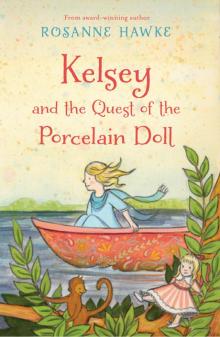 Kelsey and the Quest of the Porcelain Doll
Kelsey and the Quest of the Porcelain Doll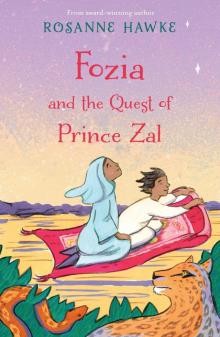 Fozia and the Quest of Prince Zal
Fozia and the Quest of Prince Zal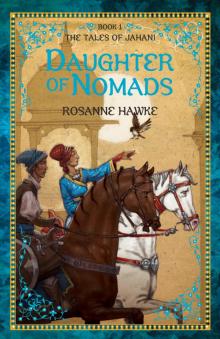 Daughter of Nomads
Daughter of Nomads The Truth About Peacock Blue
The Truth About Peacock Blue Taj and the Great Camel Trek
Taj and the Great Camel Trek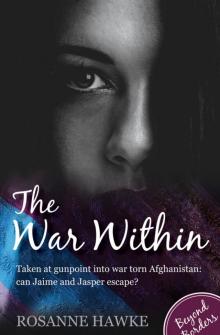 The War Within
The War Within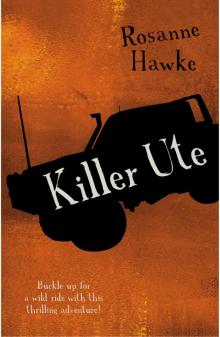 Killer Ute
Killer Ute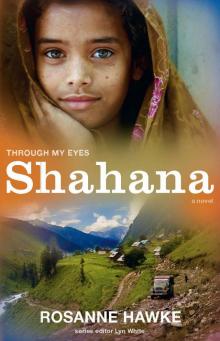 Shahana
Shahana Kerenza: A New Australian
Kerenza: A New Australian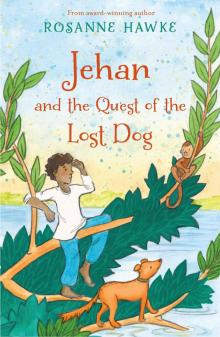 Jehan and the Quest of the Lost Dog
Jehan and the Quest of the Lost Dog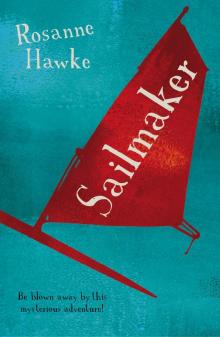 Sailmaker
Sailmaker Zenna Dare
Zenna Dare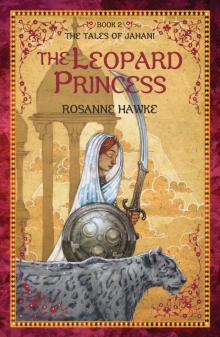 The Leopard Princess
The Leopard Princess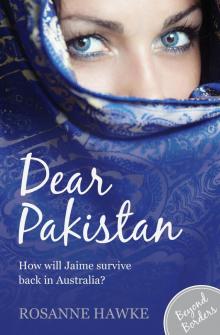 Dear Pakistan
Dear Pakistan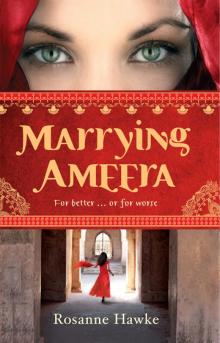 Marrying Ameera
Marrying Ameera Finding Kerra
Finding Kerra Spirit of a Mountain Wolf
Spirit of a Mountain Wolf